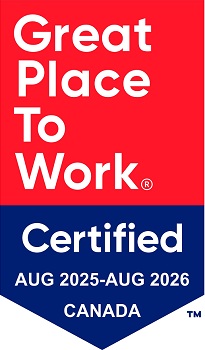
At the back of almost every refrigerator is a calcified lime, a smudge of kale. Last year, Canadians threw away a staggering $50B worth of food.1 52% of us bought a lottery ticket.2 And two thirds of us paid less than the full balance on our credit cards.3 These are objectively bad decisions. And yet, when it comes to an objectively good decision—the purchase of disability insurance—far too many Canadians come up short.
Many of us have disability insurance through our employee benefits but, all told, only 8% of working Canadians pay for coverage out of their own pocket.4
We get it. Who wants to pay for something they hope to never use? But the reality is that even the gentlest of days holds potential for cataclysmic shifts of fortune: a missed stoplight, an unexplained muscle spasm, a piano falling out of a window (seriously, it’s happened.5) And disability insurance ensures that your income is protected—or at least it should.
We spoke with Lawyers Financial advisor Jim Thompson about the realities of disability insurance, the shortfalls of group benefits, and the importance of protecting yourself from life’s worst-case scenarios.
Q: IN GENERAL, DO PEOPLE HAVE ENOUGH DISABILITY INSURANCE?
A: No. From my personal experience, people lean on group benefits too much. They think just because their workplace has an insurance plan, then that’s enough and there’s no need for individual coverage. My experience with lawyers is that they often say, “I don’t need that, I have group benefits.”
Every time I meet with someone, whether they’re there to discuss life, critical illness, or any other type of insurance, I always say, “Let’s just go over your disability coverage. Maybe it’s a good policy, but let’s just make sure.” And what I see is that very often people don’t understand how little coverage their group benefits are really offering them.
The scenario I see all the time is that somebody who’s making, say, $100,000 a year, discovers they have a policy that would only guarantee them an income of $30,000 a year. It’s more common than you’d think.
Q: SO, JUST BECAUSE SOMEONE HAS A DISABILITY INSURANCE POLICY THROUGH THEIR WORK DOESN’T MEAN THEY’RE ACTUALLY ADEQUATELY COVERED IF SOMETHING HAPPENS?
A: Exactly. A lot of the lawyers I meet are underinsured and they don’t even know it.
You’d think that an employer would have more pressure to inform employees about what benefits plans entail, but they don’t necessarily. The kind of scenario I see all the time is that somebody who’s making, say, $100,000 a year, discovers they have a policy that would only guarantee them an income of $30,000 a year.
It’s more common than you’d think, and people don’t talk about it. It’s terrifying but it’s also embarrassing for people because they’re simple mistakes. Smart people misunderstood their coverage, then the worst happens and it’s too late to do anything. But if you’re informed and proactive, these are simple things to put in place and make sure you have a plan that will cover all your needs.
Q: ARE THERE ANY DISABILITIES THAT LAWYERS OR PEOPLE WORKING IN THE LEGAL COMMUNITY ARE PARTICULARLY AT RISK FOR?
A: I don’t know the medical answer to that, but let’s just assume that a lot of these people are working in high stress environments and stress can have a negative impact on the body.
A significant percentage of claims are related to mental health.
But in general, disability is a lot broader than most people think. It’s anything that prevents you from performing your job. Any type of accident: in the yard, on the road, the possibilities are endless.
Q: WHAT FACTORS GO INTO DECIDING WHAT KIND OF DISABILITY INSURANCE POLICY IS RIGHT FOR YOU?
A: In a typical first meeting we’d go over things like existing assets, debt, if you’re married, single, have children, etc. We paint a picture of your life to understand what your level of risk is.
And there are so many factors to consider. For example, for a single person, disability insurance is important because they don’t necessarily have a support system to take care of them if something happens. For a married person, it’s important too because they need to protect their dependents.
Q: WHAT’S THE BIGGEST THING YOU WISH PEOPLE UNDERSTOOD ABOUT DISABILITY INSURANCE THAT THEY DON’T?
A: I wish more people acknowledged that you can be blindsided.
Life comes at us fast, and this is how disabilities occur. Life is a lot more fragile than people realize. I understand that insurance on an individual basis is counterintuitive. People say, “I’m fine, I don’t need it now.” But we’re typically never healthier than we are today.
You have to be direct. You can’t be afraid to talk about these things. Financial jargon is boring and hard to understand, so you need to put these things into a familiar context. I’m always willing to share experiences, good and bad, to help people understand what’s at stake here. Insurance isn’t a fun topic for most people—I think it’s fun, I could talk about it all day—but I understand that most people don’t feel that way. After meeting with me, people come out and say, “I’ve known I needed coverage, but I put it off for so long because I thought the process would be difficult.”
We can help.
A wise woman once read on a tea bag that her personal income wasn’t important. Then she went home (where she paid the mortgage), ate dinner (from her favorite take out place), and talked to her kids about everything they wanted to do on their next vacation. While it’s true that our salary isn’t the most important thing about us, the money we earn allows us to do the things we couldn’t live without. A good disability insurance plan—one that’s both comprehensive and comprehensible—protects the things that mean the most to you, no matter what happens.
Talk to a Lawyers Financial advisor about the plan that’s right for you.
Sources: 1. Second Harvest and Value Chain Management International, “The avoidable food waste technical report and roadmap,” 2019. 2: Statistics Canada, “Study: Who gambles and who experiences gambling problems in Canada,” 2018. 3. The Globe and Mail, “Many Canadians in the dark on minimum debt payments,” 2017. 4. Investment Executive, “Fewer Canadians have disability insurance,” 2018. 5. Washington City Paper, “Do falling pianos really kill people?” 2013.


